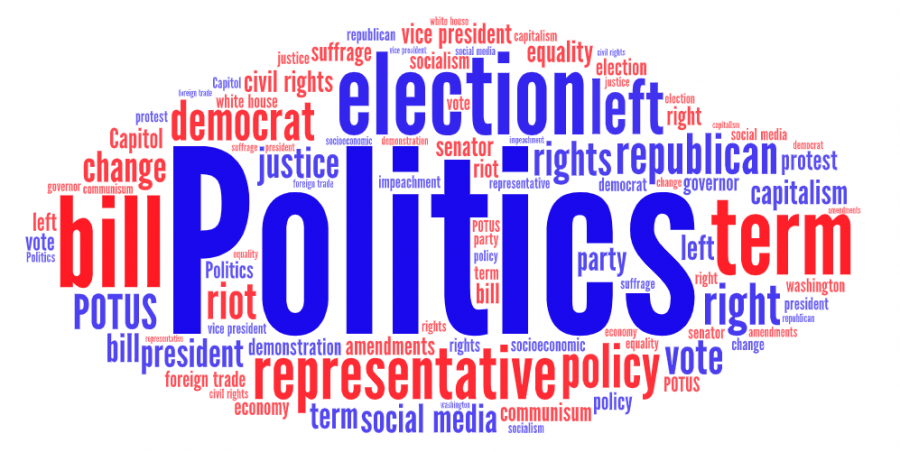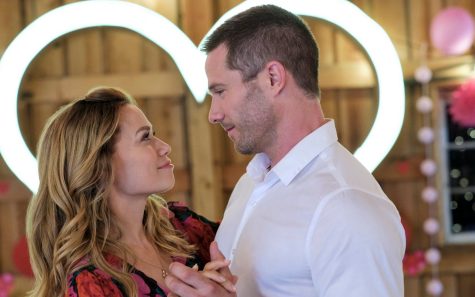Opinion: Politics Need to Stay Out of the Classroom
Discussing politics is a hot topic, especially today. However, these debates should stay outside of our everyday classroom. (digital art created by Jayden Hayden)
Times have changed.
That’s what our teacher said to our class after a heavy political argument. I have heard these words so many times in my life. The thing about saying “the times have changed” – is that it’s completely true.
Times have indeed changed. From smartphones to social media, kids in this era have the entire world in the palm of their hands at all times. However, this is definitely a double-edged sword. At times, the bad can heavily outweigh the good. This point stands particularly strong when you stumble upon the most dramatic side of every social media app – the political side of the internet.
Teens and young adults dominate the social media world. The likes, shares, and public attention fill young people with newfound confidence and creativity. Teenagers get a few likes on a post, and then they begin to crave more. This attention-seeking behavior might start as nothing important, but, like a virus, it soon begins to spread. Kids will start jumping through a lot of crazy hoops just to generate more likes, and that’s when they jump into a seemingly harmless puddle that turns out to be a deep ocean – politics and drama.
Politics is a very heavily opinionated topic. While some find the matter to be one big headache, there is a sizable group of people out there that revel in the subject, constantly shouting (typing) their opinions out in a social media post for the world to hear. That isn’t necessarily a problem; saying something unpopular on the internet does not affect your real-life unless you allow it. The problem is when these petty internet fights become genuine, real-life conflicts. And the most accessible and convenient environment to start a fight is the most social place every teen regularly attends – school.
High school, middle school, and elementary schools are far and away the most open and social place that every young social media addict regularly frequents. Though schools are usually heavily filtered, conflict still arises when students voice their opinion, and it nearly always causes another person to be offended or triggered by it. I, and many other children, have witnessed these fights first hand. It can get incredibly out of hand. Conflicts over gender, sexuality, and even expression seem to be the central drama starters in schools today.
Schools are breeding grounds for drama, and that will never change. But that doesn’t mean schools should just tolerate it. The yells and screams of political views usually earn the offender a metaphorical slap on the wrist, but I believe that schools and students should do more to alleviate the issue. I believe that schools should do a better job educating students on the power that words have and how something as simple as tone can change the entire outcome of the conversation.
Tone is one of the main factors that affect a conversation, and I think using a respectful tone should be taught in schools. Schools should explicitly teach students how to state their opinions calmly and rationally, which could be the difference between a casual conversation and an intense argument. Sarcastic and witty tones can quickly lead to the other person in the conversation getting offended, which leads to the other person matching or overpowering that same tone in return. That is where the drama starts. Surely if we know that, then we know how to end it.
There is a way to end it – educating the children who start it. Not getting angry or even reprimanding, but enlightening. Teach students about the importance of tone and wording and how to share their opinions respectfully. Edutopia suggests making your classroom debates passionate but not personal. Avoiding personal words can help prevent bitterness during a debate. Help students learn to be empathetic, listen, and be considerate of others no matter the differences.
More importantly, we should keep politics out of the regular, everyday classroom. Schools can designate certain times during specific classes to calmly debate these topics with the help of an adult who is knowledgeable on the issues.
Schools can also decide only to allow such discussions in a debate club. Debate clubs are a great way to make these respectful discussions a reality. Debate clubs have many benefits, including teaching students the power of their words. Having these safe spaces not only avoids a predictably annoying speech from educators but also prevents drama between classmates. It helps prevent friendships and relationships from breaking. It gives students a safe place to share their voices.
In the grand scheme of things, we are all human. We all love to defend ourselves and our positions. But there is a time and place for everything, and classrooms are not the place for hate. No matter your role, educator or student, let’s work to create an environment where everyone can voice their opinion without weaponizing it. Teach everyone to argue, but do it knowledgeably and respectfully.

Hi, my name is Jayce Henson, formerly known by another name, and commonly known as Jay. This year, I'm...

Hey, I'm Jayden! I'm an eighth grader and a first-year HiLife staff writer.





